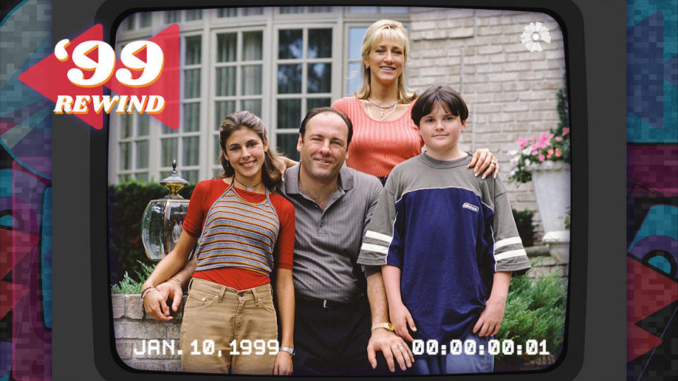
Introduction: How The Sopranos Changed Television Forever
When “The Sopranos” premiered on HBO in 1999, the world of television was about to undergo a seismic shift. At the time, most TV shows were following a well-worn formula: sitcoms, procedural dramas, and family-oriented storylines were the standard. But then, “The Sopranos” arrived and flipped the script on everything we thought we knew about TV. It wasn’t just another mob show – it was a masterpiece of storytelling that forever altered the landscape of television.
In this article, we’ll break down why “The Sopranos” was a game-changer, the lasting influence it has had on TV today, and how it set the stage for the modern era of high-quality, complex television. Buckle up – we’re going on a journey through the world of Tony Soprano, anti-heroes, and groundbreaking television that changed the way we watch.
The Birth of a Television Revolution: The ’99 Moment
“The Sopranos” wasn’t just a show; it was a catalyst for what we now call the “Golden Age of Television.” Before Tony Soprano entered the scene, TV was seen as a lesser medium compared to film. Sure, there were a few iconic shows, but they weren’t exactly pushing boundaries. Then came 1999, and with it, a series that would challenge conventions and raise the stakes for storytelling, character development, and production values on the small screen.

Breaking the Mold: The Anti-Hero Trend Begins
What made “The Sopranos” stand out from the start? The protagonist, Tony Soprano, was an anti-hero – a morally ambiguous figure who wasn’t easily categorized as good or bad. This was groundbreaking at the time, as most television characters were either purely virtuous or unequivocally villainous. But Tony? He was a mob boss, a family man, and a deeply troubled individual. The complexities of his character opened the door for a new era of anti-heroes, paving the way for shows like “Breaking Bad,” “Mad Men,” and “Dexter.”
Unprecedented Depth in Character Development
One of the things that truly set “The Sopranos” apart from its predecessors was the depth of its characters. In the past, TV characters were often one-dimensional, but “The Sopranos” allowed viewers to get inside the minds of its characters, particularly Tony. The show delved into the psychological intricacies of its characters, making them feel real and multi-faceted. This approach wasn’t just revolutionary for a mob show – it set a new standard for how TV series would be written and presented from that point forward.
A Masterclass in Writing: Long-Form Storytelling
Another way “The Sopranos” changed television was through its embrace of long-form storytelling. The show didn’t rely on the traditional episodic format, where each episode was mostly self-contained. Instead, it told an overarching story that developed and evolved over multiple seasons. This shift was crucial because it allowed for more intricate, nuanced narratives that could build on previous episodes and seasons.
Shows like “The Sopranos” made us realize that television had the potential to tell stories with the same depth and complexity as movies – if not more.
The Sopranos: Pioneering the “Anti-Hero” Trend in TV
Before Tony Soprano, TV had a tendency to portray protagonists in a more traditional light. We cheered for the good guys, and the bad guys were easily identifiable. But “The Sopranos” broke that mold by making the protagonist a ruthless mob boss. Tony was a deeply flawed character: a loving father, a conniving criminal, and a man who often struggled with his emotions. His character, and the complexity it brought, ushered in the era of the “anti-hero” in TV.
This trend wasn’t just confined to mob-related dramas. It became a staple of shows like “Mad Men” (Don Draper), “Breaking Bad” (Walter White), and “Dexter” (Dexter Morgan), where protagonists were morally ambiguous, challenging the very notion of what it means to be a “hero.”
The Rise of Cinematic Television: Quality and Production Values
One of the major innovations “The Sopranos” introduced was its high level of production quality. Prior to the show, TV was often associated with lower budgets and less attention to cinematography. But “The Sopranos” had a cinematic approach. From its careful shot composition to the sweeping camera angles, it felt more like a movie than a typical TV show. This visual style not only enhanced the storytelling but also set a precedent for other TV shows to adopt higher production values.
Shifting the Paradigm of TV Network Thinking
Before “The Sopranos,” most network executives viewed television as a medium to churn out cheap, quickly made content that could pull in high ratings. But HBO, in particular, saw something different. They realized that with shows like “The Sopranos,” television could be an art form, capable of tackling complex themes and exploring deep character studies. This shift in thinking has had a massive impact on the industry. Other networks soon followed suit, commissioning shows with greater creative freedom and larger budgets.
How The Sopranos Redefined TV Comedy and Drama
Another subtle, but impactful, way “The Sopranos” changed TV was its blending of genres. The show was, at its core, a drama, but it often had moments of humor and levity that allowed viewers to connect with the characters in unexpected ways. The humor was dark, quirky, and often absurd – making it feel more like real life. This balance between drama and comedy is something that many TV shows today continue to emulate, making “The Sopranos” a foundational text for modern TV creators.
The Sopranos’ Legacy: Lasting Influence on TV Today
Two decades later, the impact of “The Sopranos” is still evident in the shows we watch today. TV series have become more nuanced, layered, and complex, largely thanks to the groundwork laid by Tony Soprano and his troubled crew. The concept of the anti-hero has become a staple of modern television, and shows are no longer limited by conventional storytelling formats.
More Than Just a Mob Story
Yes, “The Sopranos” had the Mafia at its core, but the true brilliance of the show was in how it transcended that genre. It explored family dynamics, mental health, existential crises, loyalty, power, and identity. These themes made it relatable to a much wider audience than just mob fans, and that’s part of why its influence has endured.
Conclusion: A TV Milestone That Changed Everything
Looking back on its legacy, it’s clear that “The Sopranos” was not just a television show – it was a milestone. It took risks, broke new ground, and forever altered the way we view TV. In doing so, it helped pave the way for the era of modern television we know today, with its complex characters, dark humor, and cinematic quality. If you haven’t watched it yet, there’s no better time to experience this show for yourself – it’s a journey you won’t soon forget.
5 Unique FAQs About The Sopranos’ Impact on Television
1. What made The Sopranos stand out from other TV shows in 1999?
The Sopranos stood out due to its deep character development, complex storytelling, and the introduction of Tony Soprano as an anti-hero. It blurred the lines between good and bad, making viewers question traditional moral codes in storytelling.
2. How did The Sopranos influence modern television?
It influenced TV by showcasing how long-form storytelling could create complex, multi-layered narratives. It also pioneered the “anti-hero” trope, which became central to shows like Breaking Bad and Mad Men.
3. Did The Sopranos have a cinematic feel to it?
Yes, The Sopranos had a cinematic quality, with carefully composed shots, sweeping camera movements, and an attention to detail in production that was rare for television at the time.
4. What themes did The Sopranos explore beyond crime?
The Sopranos explored themes such as family dynamics, mental health, personal identity, existential crises, and the pursuit of power, making it much more than just a mob drama.
5. Why do people still talk about The Sopranos today?
People continue to talk about The Sopranos because of its lasting impact on TV and its relevance to modern-day themes. It redefined what TV could be, and its characters and stories still resonate with audiences today.